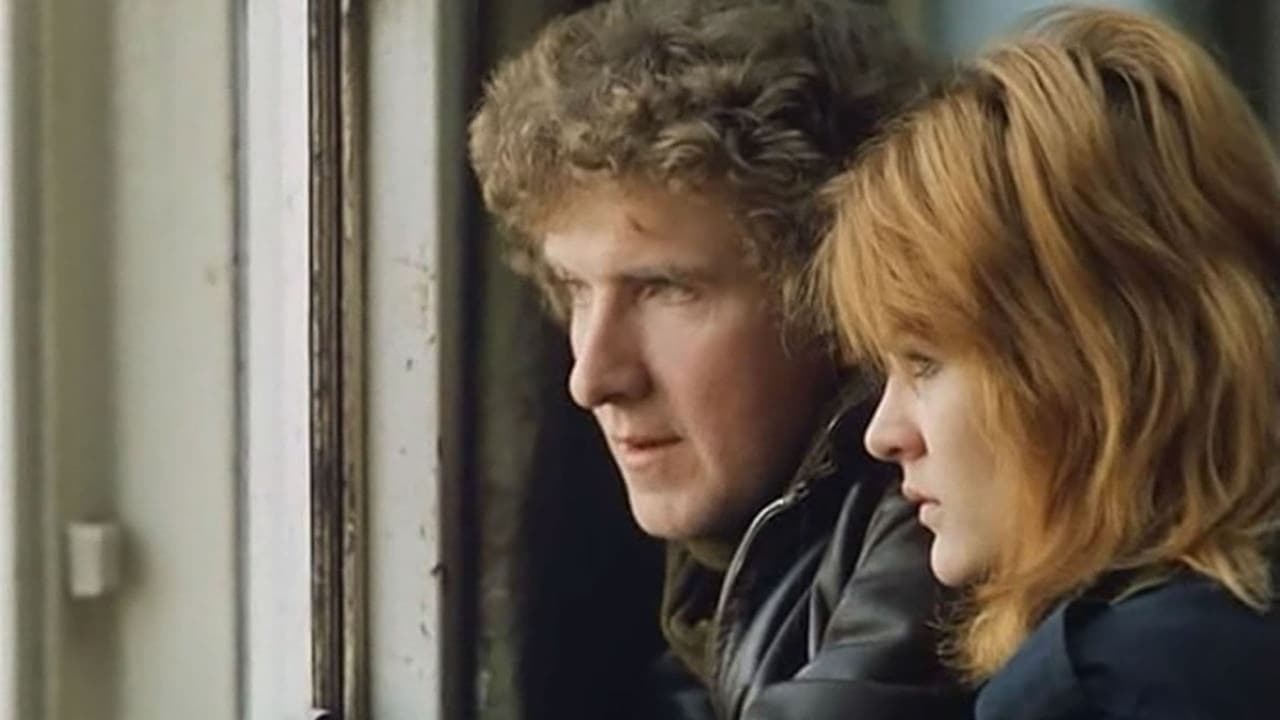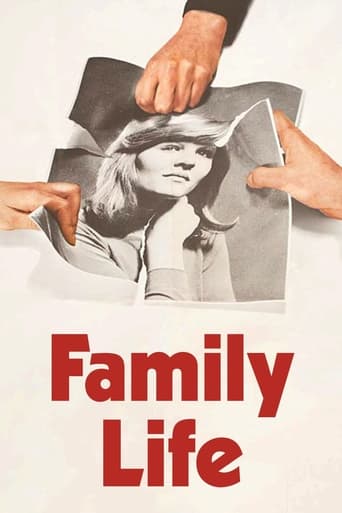

The opening credits for Ken Loach's 'Family Life' are accompanied by a montage of still shots of an industrial working class British town to establish the setting and backdrop of the narrative. During this montage we get an image of a straight line of houses in the neighbourhood. I think from a certain angle, that image is expressive of the struggles that the protagonist Janice goes through in the film. The houses stacking up one after the other in a rigid line is thematically similar to the what Janice's parents expect her to do, live her life in a specific and pre-ordained way within inflexible parameters and become the person that they want her to be instead of allowing herself to discover and realise what she wants to do with her life. They want her to become another addition to the rigid straight line of conformists. This is a tale of suffocation brought on by a rigid obligation to conform.This was released in 1971, that is right after the swinging sixties and there is abundant reference to the counter-culture movements and the hippie revolution. Janice's parents are conservative Christian working class people who look down upon the new ways of the new times. They want their daughter to do 'what's good for her' as long as what she does conforms to their rigid idea of 'good'. After Janice gets forced to abort her unborn child by them, she slowly and gradually disintegrates and becomes a mere shadow of her former self. Her rights get taken away from her and she succumbs to the pressure of rigid traditionalism.Loach doesn't do anything flashy with the camera. As a matter of fact I can't remember a single shot in the film that seeks attention. It's very understated. Loach uses the quintessential kitchen-sink drama approach and allows the scenes to progress with the help of strong dialogue instead of visual poetry. Although there is one distinct poetic scene where Janice goes on a sweet spray painting spree and we see a look of sheer joy on her face, for a change. This moment reminded me of the scene in Loach's 'Kes' where Billy explains his bird's habits to his classmates and for the first time, we can distinctly hear a new sense of passion in his voice.The screenplay I think has some weaknesses. The timeline gets muddled up unnecessarily at the beginning which makes it a bit confusing to get a grasp of the timeline and the order of the events. Secondly, although there is an attempt made to explore and humanise the parents towards the beginning of the film with a scene involving the father somewhat opening up to the doctor about his marriage and family life, however those efforts get abandoned completely and the parents gradually become more and more hate- worthy due to their constant reprehensible actions and words. I feel Loach and his screenwriter could have tried to humanise the parents a bit more which thereby would have added more complexity to the film instead of making them completely antagonistic.The tone set by Loach is naturalistic and the acting is likewise. The conversations and verbal exchanges are acted out and staged with an admirable air of authenticity. Sandy Ratcliff deserves a special mention. She convincing manages to portray a mentally troubled and depressed individual without the clichéd mannerisms that some actors resort to for selling a state of mental imbalance. She managed to make me really care for her character which is necessary for this role.'Family Life' isn't a perfect film, but it is certainly worth watching.
... View MoreForced by her parents to abort her unborn child, a teenager suffers a nervous breakdown and is taken to a psychiatrist, but the effectiveness is limited as her parents refuse to accept blame in this unpleasant yet encapsulating human drama from Ken Loach. With a cast of non-professional and first time actors, Loach manages to elicit some very down-to-earth performances and there are several memorable moments throughout as the girl struggles to cop with her loss. At one point, she draws a replacement child on her stomach with tears coming out of its eyes; at another point, she takes to deliriously spray-painting plants and trees blue as a form of expression. The film loses focus at times though with side scenes in which the hospital staff debate whether her psychiatrist's unconventional approach to therapy is worthwhile. The dialogue is also a tad problematic as the psychiatrist tends to lecture the parents at length, however, the girl's mother and father are given several great lines, most notably a flippant "who's making this code of living?" in regards to 1970s permissiveness. Other memorable quotes include "everyone's a bit peculiar" and "control is the answer" as the girl tries to ascertain whether she knows best or her parents do. This in turn is where the key strength of the film lies: the struggle of a youth to become independent when all she has ever known is dependency on her parents.
... View MoreI first saw this film a few years back in a graduate school film class and it continues to haunt me with its power. During the initial screening, I actually had to leave the class for some air and collect myself: it struck a nerve that I hadn't felt sense my teenage years: the frustration of being a troubled teenager who was sorely misunderstood. . Most parents like to think of themselves as good parents if they work and put food on the table (which is hard enough in itself.) But that is not enough! Nurturing comes to play as much as being a provider and this is something the parents just don't get. And what's sadder is that they are in a highly polarized environment (1971) between young and old, both sides too quick to assign blame. As a teenager growing up in the 90s, I experienced some of the same frustrations as the girl in this story and was all too often categorized as a "problem" simply because the adults in my life were "doing the best they could" and therefore there has to be something wrong with me. I was luckier than the girl of this story, who's best hope for salvation is vanquished by a psychiatric bureaucracy that is too concerned about appearances to have the patience to be progressive in their ways and their thinking."Family Life" is a rarity. A film that does not get old but can serve as a lesson and a warning to future generations.
... View MoreFamily Life I've seen this movie at the end of the seventies, in France, on TV. I registered it, but I lost the tape. Since, I remember a great film, the first of Ken Loach I think. Always in my memory is the last scene, Janice alone behind the students in the amphitheater's and doctor saying that the problem is in his mind and no in the relationship with her parents. I read in some reviews of this time that Ken Loach based his story on the "antipsychiatrics theories" of Dr. Ronald Laing and Cooper, that I studied in France when I was scholar, theories developed in the neighborhood of Jean Paul Sartre's existential psychoanalysis. Recently, a friend of mine, teacher of English literature in my college, initiate a curse on these problems with her students. She needs the original script of this film, but we don't know other that the French translation issued in the L'Avant-Scène french review.. Who could send me part of the script of this film (in English)? Thanks.
... View More